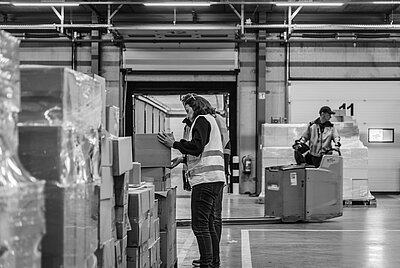More and more inner-city sites are being snapped up by retailers to help fulfil ‘last mile’ logistics – which account for 41% of supply chain costs. Not only does this change help to reduce costs, it also offers consumers speed and variety with their product choice. This shift towards smaller, agile retail experiences means that good technology and a revised supply chain strategy are essential to retail success.
If retailers are to embrace this emerging landscape and add to their existing retail property portfolio, then close attention needs to be paid to some key areas – and who is best place to make them happen seamlessly.
Micro-fulfilment
Micro-fulfilment is expected to be ten times its current level by 2025. Increasingly, retailers are creating micro-fulfilment centres in inner-city spaces or using their existing retail space and creating a micro-fulfilment centre on-site – either converting or extending what they already have.
The pandemic drastically increased the demand for local shops and stores to find ways of getting smaller items to customers quickly instead of customers going to them. From this, another channel was added to the omnichannel experience which provided retailers with a wealth of data to help improve the customer experience too.
George Dean, head of Ocado Zoom, highlights why a micro-fulfilment strategy is so important.
“Most products available on Ocado Zoom are also available on Ocado,” says Dean, “so for our buyers it just means more volume and no great change. However, we also need buyers to source products such as single-serve bottles of water and food-on-the-move items like fresh sandwiches that aren’t listed on Ocado.com.”
Fulfilling customers’ immediate retail needs (speed, convenience and personalisation) should sit at the heart of your micro-fulfilment strategy. It’s a big ask when the retail space is reacting to changes from the pandemic and customers’ needs. It’s one of the reasons why brands work with Worldpack as we can take this issue off your hands and manage the forecasting, logistics and shipping for you. Speak to us about your plans and while you concentrate on creating the best shopping experience, we’ll work on managing the supply chain for you to back you up.
Ship from store
For many retailers with a large high street presence, the pandemic emphasised how much stock was tied up in closed retail outlets with no integration to centralised warehouse data. They didn’t know how much they had or even where it all was.
We’ve previously written about how Nike managed to transition smoothly during the early stages of the pandemic because they had one digital system that tracked in-store and warehouse stock – they knew where all their stock was in the supply chain.
For any retailer looking to implement a ship from store strategy, data integration has to be your top priority. As this McKinsey report highlights, in-store fulfilment is still the most profitable option for retailers so it pays to put it first.
Ship from store during closure periods meant that staffing and stock wasn’t such an issue – there were no customers to grab the last item from the shelf. But to maintain a ship from store strategy when stores are open, it needs to account for staffing and stock levels that don’t come at the expense of your in-store customer experience.
Modern Retail highlights some of the issues retailers have to contend with when running ship from store strategies and good technology and data management comes out top. Syncing what you have in-store with what’s in the warehouse minimises confusion over stock levels and helps you to fulfil orders quickly and efficiently – maintaining that profit margin. Again, forecasting and keeping a tight ship is key to ensuring there are no gaps in stock – or GNFR products. “As a collaborative supply chain partner, we’re in constant communication with our customers to make this process as smooth as possible,” says Gertjan Lansink, Sales Manager at Worldpack.
Product diversity
For retailers looking to capitalise on the changing face of the supply chain, it’s imperative to focus on what this means for your product choices. As we saw earlier, a revised strategy means that Ocado Zoom purchases a lot more single items for speed, convenience and relevance.
A change in supply chain strategy doesn’t just mean ordering more stock for more spaces. It’s careful consideration of what customers want and need. And with both micro-fulfilment and ship-from-store, the more localised your product range, the better.
French supermarket group, Carrefour, has recently launched a same-day delivery service for customers with access to 20,000 products alongside e-grocery marketplace, Everli. With products initially being selected from current in-store ranges, Everli hopes that customer data collected from Carrefour's insight and technology tools could give them invaluable data for their buyers.
Local fulfilment has offered larger companies like Amazon, Google and Costco the opportunity to remove any doubt for their buying team – they can make informed decisions about product ranges and volumes based on consumer purchasing habits. Less speculation makes for a more profitable supply chain but you need to know your customers’ needs, so you can work around them. The more data you have on your customers, the better. It means a more sophisticated, personal experience for them in the long run. And that’s a win-win situation for building brand loyalty.
If you’d like to explore how a change in supply chain strategy could support your fulfilment teams, then our account managers are here to help. You can email at online@worldpack.eu or ring us on +31(0) 88 494 20 80.


